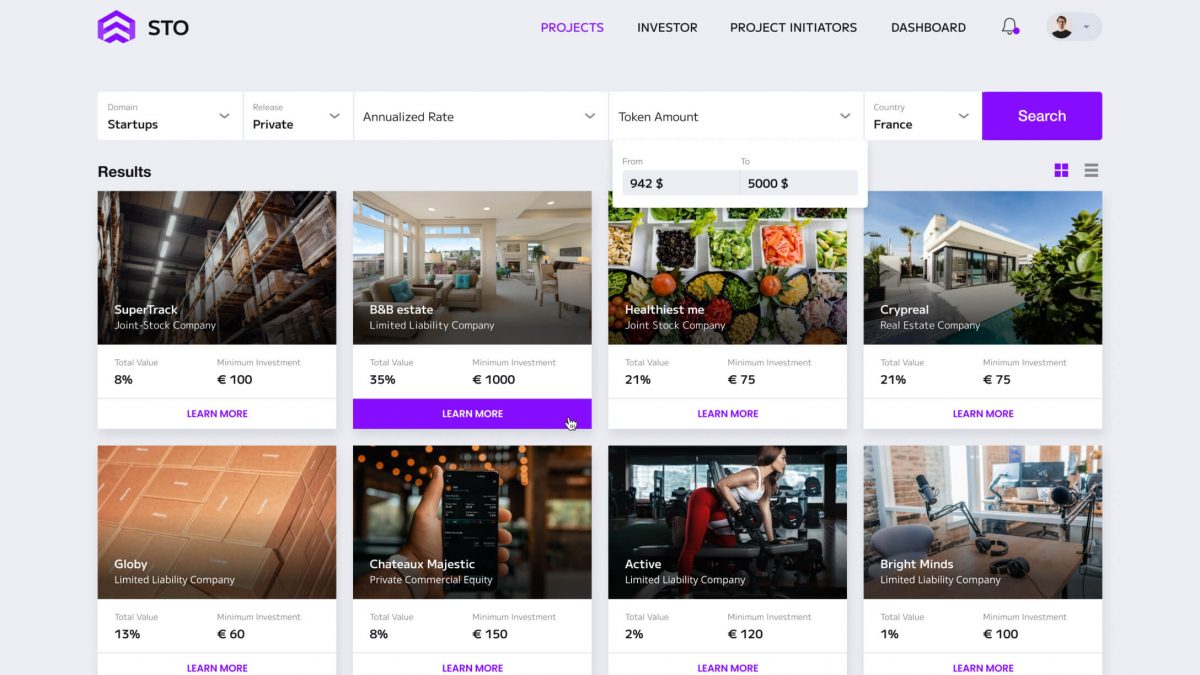Though blockchain in real estate is a relatively new phenomenon, the number of related use cases grows daily. We performed in-depth research and came up with several domains where blockchain has clearly proved its effectiveness, and the demand for these blockchain real estate products is really high.
Let’s meet them by taking a closer look.
5 Incredible Blockchain Real Estate Use Cases you Wouldn’t Believe
-
Blockchain Real Estate Smart Contracts
One shouldn’t underestimate the risks associated with real estate investments. Yes, investing money often comes without the guarantee you will get returns from sold or rented property. One of the most common ‘scam’ schemes in real estate is when you invest money in a construction project, where, ultimately, the construction process never begins, and fraudsters disappear with the money you gave them.
However, smart contracts are designed to ‘bring down’ these scams. When entering into an agreement, you specify its terms in a smart contract, which can’t be altered afterward. Once the terms are met, the smart contract automatically triggers the necessary actions (the ones that you also initially defined in it in the ‘if X then Y’-like form). These actions can’t be reversed as well, nor can they be controlled by any party in the agreement.
As a result, smart contracts ensure property investments are reliable; basically, smart contracts are able to arrange the process in a way where shareholders could automatically get payouts after the asset starts bringing ROI.
Alternatively, smart contracts can serve to attract more investors in real estate without income limits. That is, an asset can be divided among multiple investors, so people can invest relatively little sums into real estate.
Startups like Republic, VairT, or RealT are good examples of blockchain real estate platforms that offer solutions for more efficient investments. In a nutshell, a user needs to visit a website, choose a property they would like to invest in, register on it, and purchase tokens as the investment in the chosen asset.
Our latest property is available to purchase on our marketplace this is our first offering in which both US accredited investors (REG D) and international investors (REG S)!
Reg D: https://t.co/lo0fBB8wL2
Reg S: https://t.co/qWQrlbl6AB#RealT #Blockchain #DeFi #GnosisChain
— RealT (@RealTPlatform) June 8, 2022
-
Property Management
There are at least several businesses in the industry, like ManageGo, that already harness the possibilities of blockchain in real estate management. That is, regular tasks like rent collection, maintenance, credit history checks, and more become more transparent.
For example, the most common scenario in the ManageGo app is the following: tenants submit maintenance tickets either through the app or via email. Respectively, the management can reply to those or create work orders to assign to the responsible customer relations reps. The assigning process happens automatically when a certain category or building is attributed to it, and the ticket is directed to the right person. Blockchain acts as a register and storage where all tenants’ requests are logged and kept forever.
-
Tokenized Real Estate
Linked to tokens that are used for the related platform’s transactions, smart contracts allow making those more secure. Companies like PropertyClub, SMARTRealty, SafeWire, and others realize this idea with their own marketplace for trading and renting property using smart contracts.
We at Aetsoft didn’t stay aside as well; at the time, we created a white-label blockchain solution with tokenization features. Though real estate is just one of its applicable use cases, it deserves to be mentioned here.
The platform allows tokenizing real estate assets by representing them in the form of tokens by utilizing blockchain technology.
It provides users with direct access to investments by removing intermediaries (brokers and banks) and reducing the cost of transactions (the investor can make all transactions single-handedly without needing to pay broker fees).

-
Home Sharing
Could one even imagine that with the help of blockchain, a home-sharing platform like Airbnb can be built? Potentially, it’s true as blockchain’s capabilities allow for it, but customers will have to pay rent for real estate with crypto instead of fiat money.
The Dtravel platform is a good example of such a solution. With this ‘marketplace’ service, users can rent apartments directly from their owners while being charged a fee from each transaction they make on Dtravel. But there’s more; the developers position the platform as a decentralized community of homeowners, allowing the latter to earn money by supporting the development of their startup.
-
Property Construction in Blockchain Real Estate
As we said earlier, smart contracts can ensure automated compliance with agreements, so you may not worry about contract violations anymore. This case should be particularly applicable in large construction projects that usually lack transparency, a large part of which comes to procurement and management of supply chains. There, blockchain could assign immutable, irreplaceable tokens to each resource unit so one could easily trace them. In this way, project managers could see its progress in real-time and share updates with stakeholders.
And it happens already. BuildSort, a blockchain real estate solution for construction management, allows creating smart contracts with suppliers and contractors and managing payments in this reliable way. Moreover, it compiles data from all the available sources to provide real-time updates on a construction project with a 3D visualization of property under construction.
Stacking Up
Among the multitude of benefits blockchain gives to real estate, most importantly, it helps to prevent fraud in transactions (or at least make it harder), exclude manual paperwork, and cut expenses. However, due to blockchain’s complex nature, the development of a blockchain real estate solution is not an easy task.






